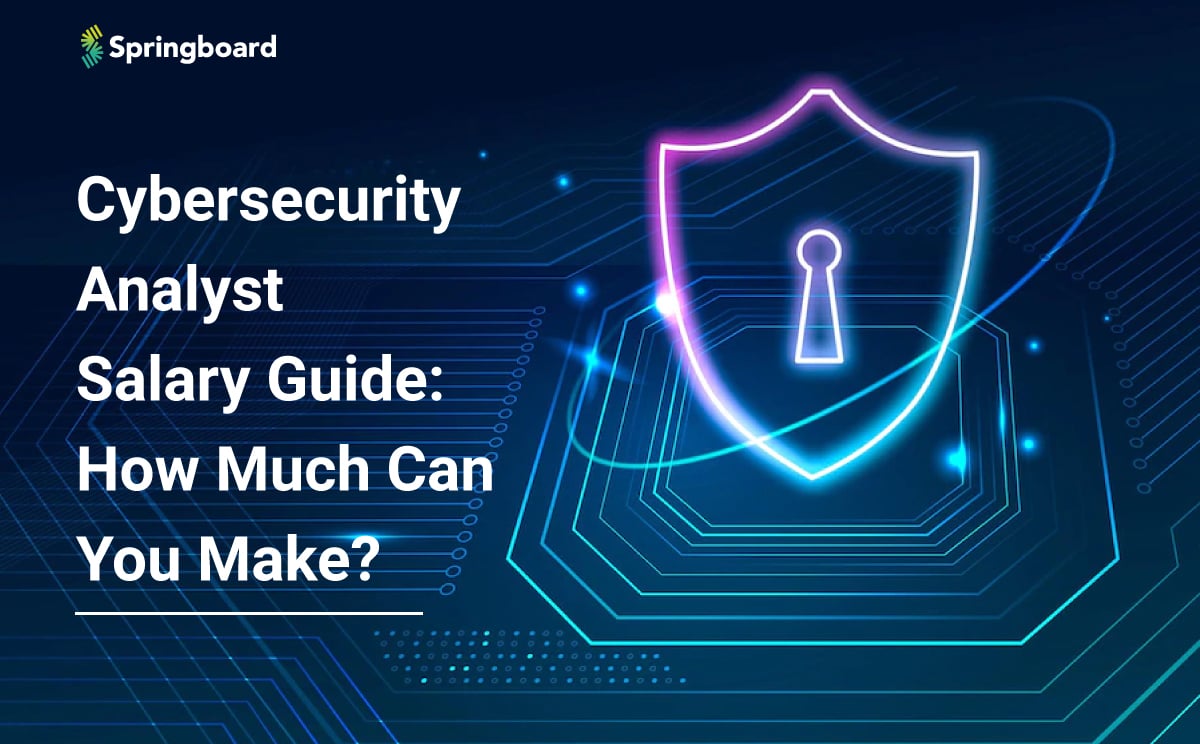Free Cybersecurity Course
Enter the cybersecurity field with our free introductory course. Learn the basics and build a strong foundation.
This article covers the essential factors you should consider when looking at a career in cybersecurity, including market conditions, prerequisites, and the career path. For a snapshot of the career, see the table below:
The following sections break down each category in the above table, going into more depth on the state of cybersecurity careers moving into 2024.
The Cybersecurity Market in 2024
Cybersecurity positions are at a strange premium. While the market is generally experiencing a surge, the competition for individual cybersecurity positions has become highly competitive. Despite a surge of remote work opportunities over the last several years that’s made cybersecurity positions available from almost anywhere, our research did reveal that some of the most active states for cybersecurity jobs include:
- California
- Colorado
- Florida
- Illinois
- Texas
- Massachusetts
- Virginia
Cybersecurity job openings are projected to grow by 3.5 million vacancies by 2025, with approximately 16,800 new positions opening every year. Government data suggests these openings result from current professionals leaving the industry, either due to retirement or switching to another industry. This data suggests a high level of industry turnover, most likely due to the stress and long hours commonly associated with cybersecurity positions.
Despite this turnover, however, competition for cybersecurity jobs is much higher than in other industries. This can be confusing for new applicants, given the low number of applicants per job (currently about 65 applicants per new role) and the low employee retention levels. Such competition, however, is primarily due to the high expectations and qualifications placed on applicants; very few make it through the initial screening process conducted by a company’s human resources department, making it essential to have the right qualifications.
Is Cybersecurity a Good Career? The Pros and Cons
Cybersecurity is, overall, a great profession. The aspect that commonly draws in applicants is especially high salary and opportunities for growth and specialization within the industry. In addition, cybersecurity is one of the few careers in which it’s possible to obtain a high-paying job without requiring a formal college degree.
That being said, cybersecurity is not for the faint of heart. The job is notably stressful compared to other positions within the tech industry, which leads to high turnover rates and employee churn (~20% as of Q1 2023, although this number includes people pursuing a similar position at a different company.) As a result, employees in cybersecurity should be prepared to face long hours working in what is often an understaffed department.
With those caveats in mind, however, the challenge often draws people to a career in cybersecurity. Most commonly, the best cybersecurity candidates are people who are curious by nature and are compelled toward problem-solving. Similarly, the patience required to work in any coding-related field translates well into the stresses of a job in cybersecurity.
Salary
The average salary for careers in cybersecurity is ~$119,000 per year. This average, however, varies widely in terms of the actual position being filled. The table below breaks down salaries in cybersecurity: For ease, we have further broken down the information according to common entry-level, mid-level, and senior-level positions:
Cybersecurity positions, particularly at the higher levels, are high-earning jobs. This is, in part, due to the specialized skills required to do the work and also, in part, due to high expectations placed on those who have them.
Skills/Qualifications
According to the US Bureau of Labor Statistics, cybersecurity jobs rarely, if ever, offer on-the-job training. This means that obtaining a cybersecurity position requires the applicant to already have completed at least one of several cybersecurity-related prerequisites to be seriously considered for the position.
The table below outlines the most common degrees and certifications found among those currently working in cybersecurity. For each specialty, we’ve identified the frequency (how commonly a prerequisite is found in cybersecurity employees) as well as the average length of time required to achieve it:
Soft Skills
Another factor in securing a cybersecurity position is the applicant’s “soft skill” set, which refers to their communication skills, flexibility, and ability to lead a team. These factors are not included in the table above due to their difficulty to quantify; however, our data suggests that these skills are in short supply within the cybersecurity industry, making applicants who possess them more attractive to HR professionals.
Technical Skills
The most important aspect of building a career in cybersecurity is developing your technical skills. As you complete your degree or certification, consider additional factors, like:
- OS Knowledge. Understand how different operating systems work internally and how they work with each other (e.g., transferring data from one to the other), and keep yourself up-to-date on how each system is developing over time.
- Programming Languages. The most common programming languages in cybersecurity include Python, Java, and Javascript. Cybersecurity professionals in any sub-discipline need to have a working familiarity with each, in order to be competitive applicants.
- Network Security. Cybersecurity professionals have to understand how networks work, how they affect computer systems, and what kinds of vulnerabilities they are likely to have in the face of possible cyberattacks.
- Encryption. A central part of cybersecurity work is effectively safeguarding data through the process of encryption; there are specialists for whom encryption is their entire responsibility, so it’s a critical skill for anyone getting into the industry to learn.
Career Path
As mentioned previously, cybersecurity positions do not require a college degree, assuming you have the right certifications. That being said, there are typically two major paths that employees in cybersecurity follow, as depicted in the graphic below:
Traditional
Alternate
Because of the high expectations placed on new hires in cybersecurity, the vast majority of new hires begin with a college degree. This is often a confusing data point since entry-level cybersecurity positions rarely require a college degree (as long as you have the right certifications). Typically, this commonality is because people with a college degree already have a head start on their career paths from early on, which also makes them more likely to follow through and get the proper certifications during or upon completion of their degrees.
So, Is Cybersecurity a Good Career?
In short, yes – but the longer, more accurate answer is “Yes, but it requires having the right tools at your disposal.”
If you want to speed up your learning process, you may want to consider enrolling in an online bootcamp. Springboard’s Cybersecurity Bootcamp is a 100% online 6-month course that provides students with 1-on-1 mentorship and offers cutting-edge industry knowledge that covers the latest developments in AI and interactive learning. Upon graduation, Springboard assists you in securing a job by providing career guidance and job search assistance.
If you are interested and need more information before getting started, our teams are happy to talk with you. Contact us when you are ready to get started.
Since you’re here…
Interested in a career in cybersecurity? With or Cybersecurity Bootcamp, you’ll get a job in the industry, or we’ll return your tuition money. Test your skills with our free cybersecurity course, and check out our student reviews. We’re a safe bet. 🔒😉



